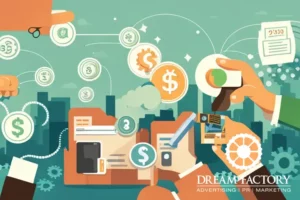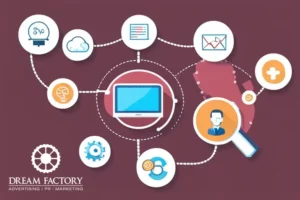Why B2B ABM Is Your Essential Strategy
- B2B, B2B Strategy, Lead Generation, Marketing Trends
- December 18, 2021
Are you looking to increase efficiency and reach your goals faster with B2B marketing automation services? Dream Factory Agency understands the importance of modernizing your business’s marketing efforts, driving growth, and increasing customer engagement. With an array of automated services tailored for the B2B market – from AI-powered solutions to lead generation and analytics – we can help you identify the best approach to success. Our team is dedicated to providing intuitive, efficient, and cost-effective solutions to fit your organization’s needs.
 Marketing Automation automates key tasks and enables the creation of more complex, tailored message flows based on how target-customers respond or don’t. Manual processes can get out of sync and result in frustrations about the quality of leads, as well as the timeliness of hand offs. Marketing automation technology, uses data to help sales and marketing identify the best leads.
Marketing Automation automates key tasks and enables the creation of more complex, tailored message flows based on how target-customers respond or don’t. Manual processes can get out of sync and result in frustrations about the quality of leads, as well as the timeliness of hand offs. Marketing automation technology, uses data to help sales and marketing identify the best leads.
Outsource your marketing automation to Dream Factory and leverage our extensive industry experience, global reach, and commitment to customization. Whether you’re in entertainment, business services, or any other sector, our data-driven, holistic solutions are tailor-made to catapult your business to new heights.
Embark on a transformative journey with Dream Factory’s B2B Marketing Automation Strategies. Customization, innovation, and client success are at the heart of what we do. Let’s build something extraordinary together.
Marketing automation strategies can vary widely between B2B and B2C contexts. Below is a table that outlines some of the fundamental differences. However, it’s important to note that this is a simplified overview. In practice, marketing automation can be much more nuanced and complex, with strategies often tailored to the specific needs and characteristics of each business and market. Customization and adaptation are key, as businesses may find value in blending elements from both B2B and B2C approaches based on their unique objectives and audience.
| Feature/Aspect | B2B Marketing Automation | B2C Marketing Automation |
|---|---|---|
| Primary Goal | Lead nurturing and relationship building | Immediate sales and customer engagement |
| Sales Cycle | Generally longer and more complex | Generally shorter and more streamlined |
| Content Type | More educational and informative content, such as whitepapers, case studies, webinars | More promotional and entertaining content, such as discounts, contests, and product showcases |
| Buying Decision Process | Often involves multiple decision-makers and is based on rationality and ROI | Usually involves individual consumers and is more driven by emotions and personal preferences |
| Communication Channels | Email, LinkedIn, trade shows, webinars | Email, social media, apps, websites |
| Volume of Leads | Lower volume of leads with higher individual value | Higher volume of leads with lower individual value |
| Personalization | Customization based on business needs and pain points | Customization based on consumer preferences and behavior |
| Measurement Metrics | Lead quality, ROI, customer lifetime value, and account growth | Conversion rates, customer acquisition costs, customer lifetime value, and engagement metrics |
| Lead Scoring | More emphasis on lead scoring to prioritize efforts | Less emphasis, as consumer purchases can be more impulsive |
| Customer Relationship | Focus on long-term relationships | Focus on both one-time purchases and fostering repeat business |
Harness the power of marketing automation to streamline your campaigns and reduce costs. Our expertise in content development and marketing, coupled with automation, ensures that your marketing efforts are optimized for maximum impact.
For instance, if you are in industrial manufacturing, we’ll automate and refine your content distribution, freeing your team to focus on product innovation and client interaction.
Marketing automation tools are channel-agnostic in the sense that they can be used in different marketing platforms that include: email, SEO, CRM tools and social media. Additionally, the platform serves as a centralized hub for a variety of marketing activities, making the marketing professional’s life a whole lot easier.

Drip campaigns are a cornerstone of an efficient sales process. Through our automation strategies, we ensure your leads receive targeted information over time. For instance, for energy sector businesses, we could automate a series of emails educating leads on sustainable energy solutions, effectively shortening the sales cycle.
Marketing automation tools are channel-agnostic in the sense that they can be used in different marketing platforms that include: email, SEO, CRM tools and social media. Additionally, the platform serves as a centralized hub for a variety of marketing activities, making the marketing professional’s life a whole lot easier.
Data-driven insights are crucial in understanding customer behavior. We apply our market segmentation and analysis prowess to marketing automation. If you’re a financial services firm, we’ll analyze interactions with your content, optimizing your strategy to engage decision-makers in the financial industry more effectively.
Lead scoring and nurturing are integral to conversion. Our audience response monitoring and customized content development services, when combined with marketing automation, create a powerful mechanism to identify and nurture leads across channels. For property development businesses, we help in scoring leads based on their engagement and automating follow-ups.
Dream Factory Agency ensures your messages are custom-fit to resonate with your audience. For non-profits, for example, our automation solutions will ensure that messages emphasize impact and community development, engaging donors and stakeholders.
Combining marketing automation with AI enables unprecedented audience segmentation. For technology businesses, our deep understanding of the sector allows us to utilize AI to segment your audience based on niche interests, resulting in highly targeted campaigns.
B2B marketing automation strategies refer to the use of technology and software to automate repetitive and time-consuming tasks in the marketing process. This includes tasks such as lead nurturing, email campaigns, social media scheduling, and data analysis.
There are many great marketing automation tools available for B2B lead generation. The best tool for your business will depend on your specific needs, budget, and goals. The following are some of the more popular options:
These tools allow businesses to automate repetitive tasks in their marketing process to improve efficiency, increase ROI and generate leads at scale.
There are several different types of marketing automation that businesses can use depending on their goals and objectives:
A persona is a fictional representation of an ideal customer based on real data about their behaviors and demographics gathered through research methods such as surveys or interviews.
In B2B marketing automation, personas help marketers understand their target audience better by creating detailed profiles of their ideal customers' key characteristics, such as job title/description/role within an organization/company size/industry vertical/age/gender/income level, etc.
By developing buyer personas, marketers can tailor their automated messaging more effectively, thereby attracting more qualified leads while improving conversion rates over time.